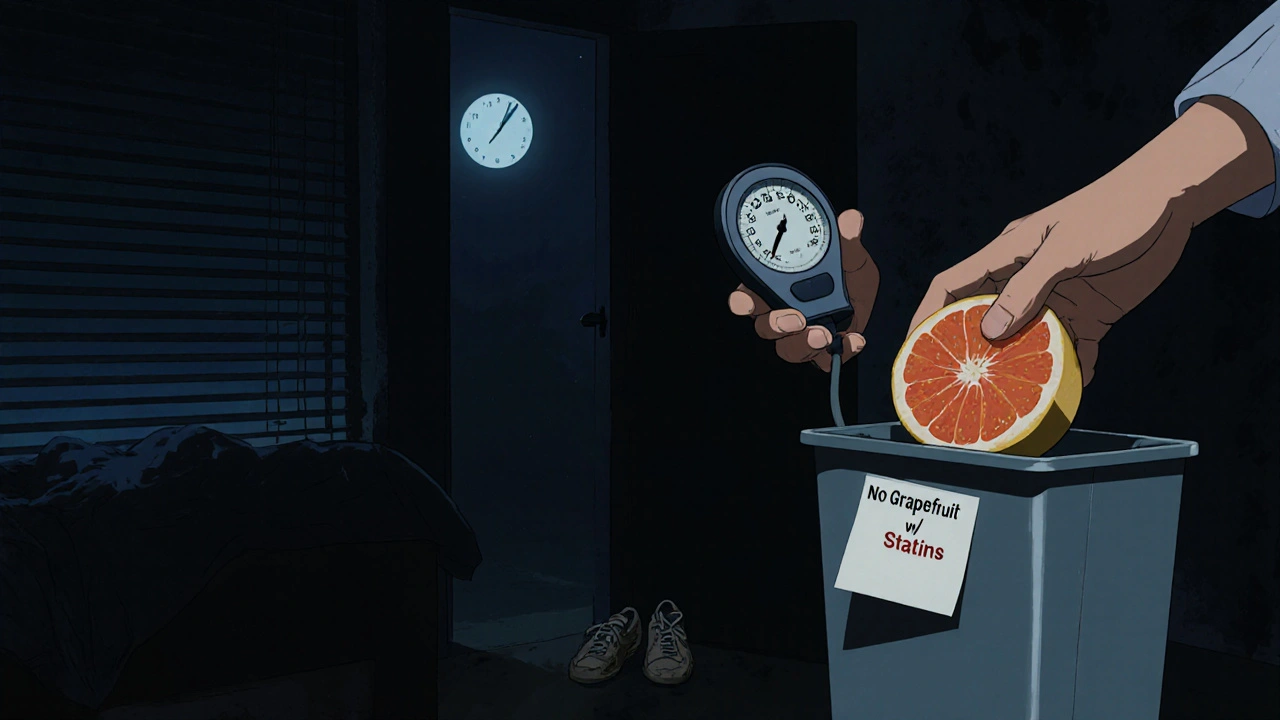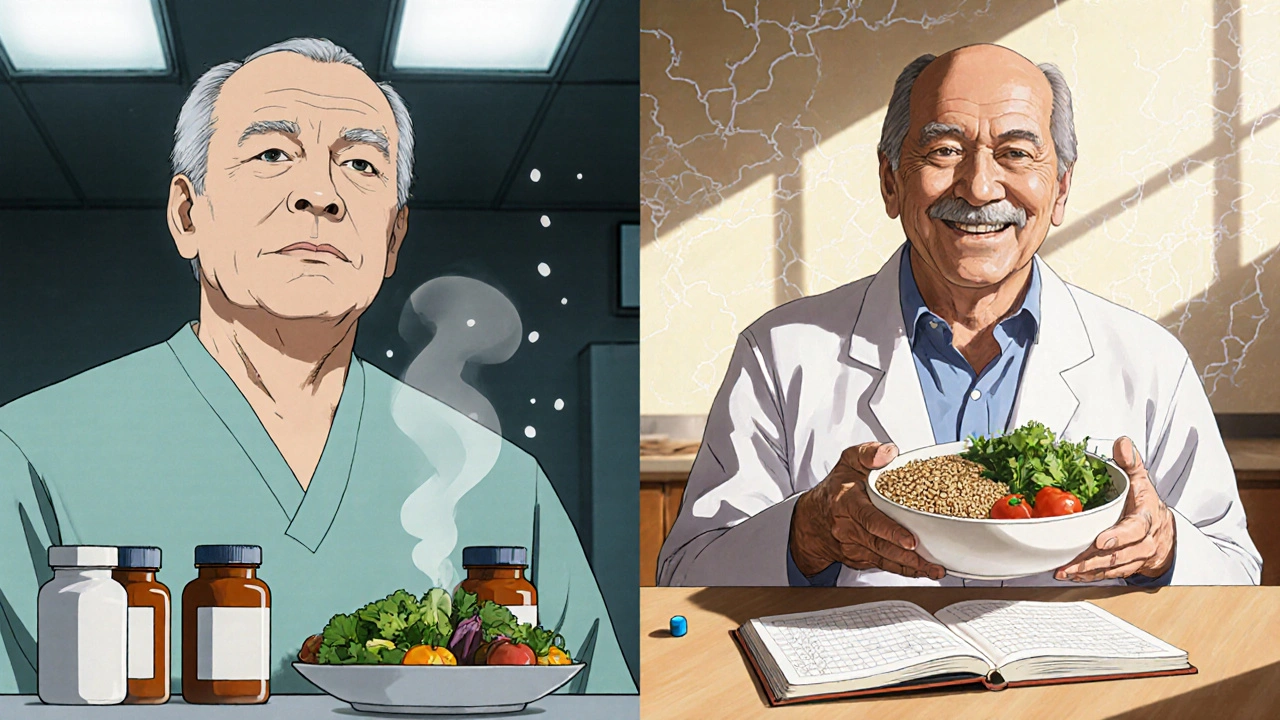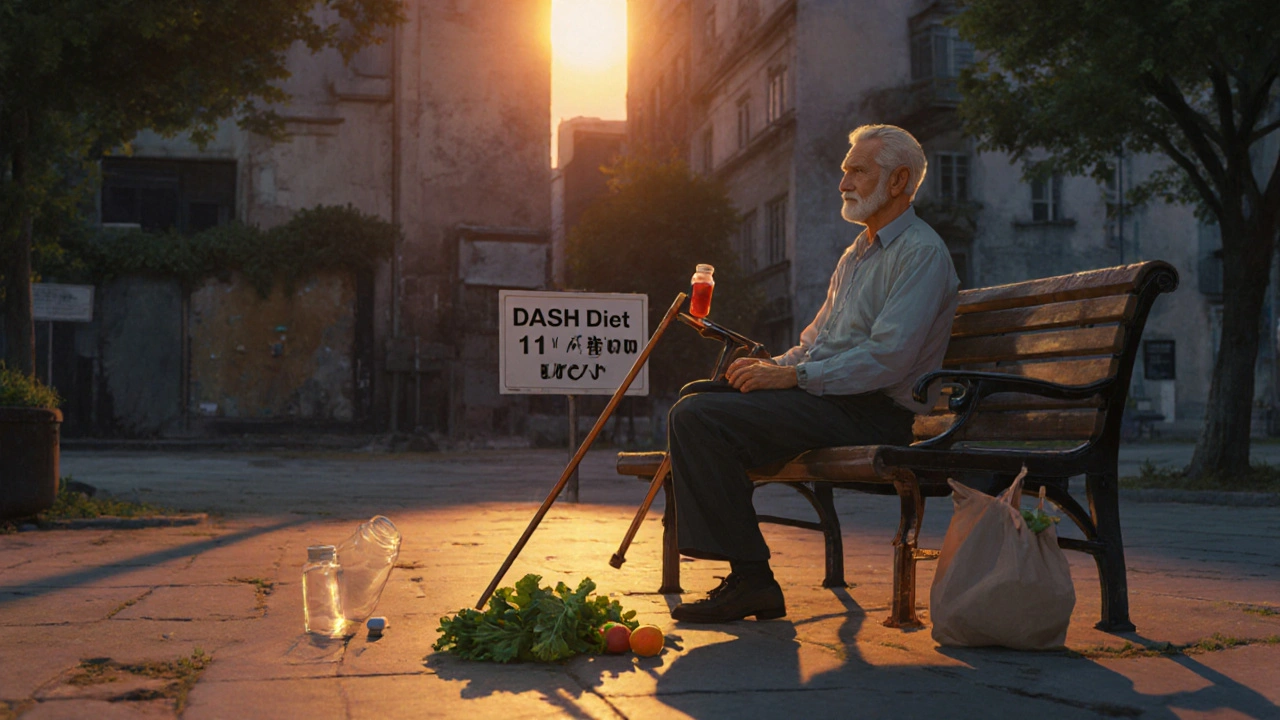Every year, over a million people in the U.S. end up in the emergency room because of bad reactions to their medications. Many of these cases aren’t caused by errors in prescribing-they’re caused by things you do every day: what you eat, how much you sleep, whether you move your body, and how you handle stress. The truth is, medication risks don’t have to be inevitable. Simple, consistent lifestyle changes can cut those risks in half-and sometimes even let you take fewer pills.
Why Lifestyle Changes Work Better Than You Think
Medications treat symptoms. Lifestyle changes fix the root causes. That’s why a person with high blood pressure who walks 30 minutes a day, three times a week, can see their numbers drop as much as someone on a pill. The same goes for type 2 diabetes: losing just 5-7% of your body weight through diet and movement can slash your need for insulin or metformin by up to 60%. This isn’t anecdotal. A 2023 analysis of 247 studies involving over 3.4 million people found that lifestyle changes reduced medication use by 25-50% for chronic conditions like hypertension, diabetes, and high cholesterol. The problem? Most people think lifestyle changes are a replacement for meds. They’re not. They’re a partner. Harvard Medical School’s Dr. Rob Shmerling says it plainly: medications should be in addition to lifestyle changes, not instead of. When you stop walking because you’re on a blood pressure pill, or eat junk because you’re on a statin, you’re undoing the work the drug is trying to do.The Big Four: Sleep, Movement, Food, and Stress
There are four pillars that make the biggest difference when you’re on medication. Get these right, and you reduce your risk of dangerous side effects, hospital visits, and drug interactions.Sleep: The Forgotten Medicine
Most adults need 7-9 hours of sleep a night. If you’re consistently getting less, you’re increasing your risk of high blood pressure, insulin resistance, and weight gain-all conditions that make your medications work harder, or less effectively. A 2022 study showed that people who slept less than six hours nightly were 20% more likely to need additional medications over time. Poor sleep also messes with your liver’s ability to process drugs, which can lead to dangerous buildup in your system. Start small: go to bed 15 minutes earlier. Turn off screens an hour before sleep. Keep your room cool and dark. These aren’t luxuries-they’re safety measures.Movement: Your Heart’s Best Friend
You don’t need to run a marathon. Just 150 minutes a week of brisk walking-about 30 minutes, five days a week-is enough to lower blood pressure as much as a single pill. Strength training twice a week helps too, especially for people on diabetes meds, because muscle burns glucose more efficiently. One person on Reddit shared how they lowered their blood pressure from 150/95 to 125/80 in six months by walking daily and cutting sodium. Their doctor took them off one pill. That’s not luck-it’s physiology. When your heart gets stronger, it doesn’t need as much help from drugs to pump blood.Food: What You Eat Can Make or Break Your Meds
Some foods don’t just help-they interfere. Grapefruit, for example, blocks enzymes in your liver that break down 85% of statins. That means the drug stays in your body longer, raising your risk of muscle damage and kidney issues. If you’re on a statin, grapefruit isn’t just a no-it’s a danger zone. Leafy greens like spinach and kale are full of vitamin K, which can cancel out the effect of blood thinners like warfarin. One day you eat a big salad, and your INR drops. The next day you skip it, and your blood clots. That’s why consistency matters more than perfection. For diabetes, a diet focused on whole grains, lean protein, and non-starchy veggies can control blood sugar as well as metformin. For high blood pressure, the DASH diet (rich in fruits, vegetables, low-fat dairy, and nuts) lowers pressure by 11/5 mm Hg-equal to a single pill. Don’t go on a crash diet. Just cut out processed foods, added sugar, and excess salt. Replace them with real food. Your body-and your prescriptions-will thank you.Stress: The Silent Med Killer
Chronic stress raises cortisol, which spikes blood sugar, increases blood pressure, and causes inflammation-all things your meds are trying to fix. If you’re stressed all the time, your body fights your drugs. Simple stress reducers work: 10 minutes of deep breathing, daily walks in nature, or 15 minutes of yoga can lower blood pressure and improve insulin sensitivity. A 2024 study at UC Davis found that patients who practiced mindfulness for eight weeks reduced their need for anxiety and blood pressure meds by 20%.How Much Can You Really Reduce?
It’s not about quitting meds cold turkey. It’s about working with your doctor to get to the lowest effective dose. Here’s what real people have achieved:- People with prediabetes who lost 5-7% of body weight cut their diabetes medication needs by up to 60%.
- Those with high blood pressure who followed the DASH diet and cut sodium saw results equal to one pill.
- Patients on GLP-1 receptor agonists (like Ozempic) who also walked daily, slept well, and ate whole foods cut their cardiovascular risk by 40% compared to those on meds alone.

What to Avoid: Dangerous Myths and Traps
There are three big mistakes people make when trying to reduce medication risks:- Stopping meds on your own. Never do this. Abruptly stopping blood pressure or diabetes meds can cause strokes, heart attacks, or dangerous spikes in blood sugar. Always work with your doctor.
- Assuming ‘natural’ means safe. Supplements like St. John’s Wort, garlic pills, or green tea extract can interact with antidepressants, blood thinners, and heart meds. Talk to your pharmacist before taking anything new.
- Waiting for quick results. Lifestyle changes take time. You won’t see results in a week. It takes 3-6 months of consistent effort to lower blood pressure or improve insulin sensitivity enough to reduce meds. If you give up after a month, you’ll never get there.
How to Start-Without Feeling Overwhelmed
You don’t need to overhaul your life overnight. Pick one thing. Do it for 30 days. Then add another.- Week 1-2: Add a 15-minute walk after dinner. No phone. Just movement.
- Week 3-4: Swap one processed snack for fruit or nuts.
- Week 5-6: Set a bedtime and stick to it. No screens after 9 p.m.
- Week 7-8: Talk to your pharmacist about food-drug interactions. Ask: ‘Are there any foods I should avoid with my meds?’

When to Talk to Your Doctor
You don’t have to do this alone. In fact, you shouldn’t. Schedule a visit with your doctor and bring your lifestyle log. Say: ‘I’ve been walking, eating better, and sleeping more. I’d like to see if we can reduce any of my meds safely.’ Many doctors now support lifestyle medicine. The American College of Lifestyle Medicine has over 12,000 certified practitioners. Medicare Advantage plans even cover some of these programs now. Ask if your insurance offers a lifestyle coaching program. It might be free.The Bigger Picture
We’re in the middle of a medication crisis. Polypharmacy-taking five or more drugs-is linked to a 300% higher risk of serious side effects. The average 65-year-old in the U.S. takes four prescriptions. Many are for conditions that could be prevented or reversed with lifestyle changes. This isn’t about being perfect. It’s about being consistent. You don’t have to eat kale every day. You just have to eat less junk. You don’t have to run a marathon. You just have to move more than you sit. The goal isn’t to live without pills. It’s to live with fewer pills-and more life.Can lifestyle changes really replace my medications?
No-lifestyle changes should never replace medications without your doctor’s approval. But they can reduce how much you need. For example, losing 5-7% of your body weight can cut diabetes medication needs by up to 60%. High blood pressure can improve as much with diet and walking as with one pill. The goal is to lower doses safely, not quit meds abruptly.
What foods should I avoid if I’m on blood pressure or cholesterol meds?
Grapefruit interacts with 85% of statins and can cause dangerous muscle damage. Leafy greens like spinach and kale are high in vitamin K, which can reduce the effectiveness of blood thinners like warfarin. Dairy can block absorption of some antibiotics. Always ask your pharmacist: ‘Are there any foods I need to avoid with my specific meds?’
How long until I see results from lifestyle changes?
It takes 3-6 months of consistent effort to see measurable improvements in blood pressure, blood sugar, or cholesterol. Some people feel better in weeks-more energy, better sleep-but the real clinical changes take time. Don’t give up if you don’t see results in a month.
Can I still drink alcohol if I’m on medication?
It depends. Alcohol can raise blood pressure, interfere with diabetes meds, and increase liver damage from statins. The general rule: one drink a day for women, two for men. But if you’re on antidepressants, painkillers, or sleep aids, even one drink can be risky. Always check with your doctor or pharmacist.
What if I can’t stick to a healthy diet or exercise routine?
Start smaller than you think. One 10-minute walk. One less sugary drink a day. One extra hour of sleep. Progress isn’t all-or-nothing. Many people struggle with consistency-that’s normal. Focus on building habits, not perfection. If you need support, ask your doctor about a lifestyle coaching program. Many insurance plans cover them now.

Brad Seymour
November 10, 2025 AT 03:18Man, I wish I’d known this five years ago. I was on three meds for blood pressure and prediabetes, felt like a zombie, and thought lifestyle changes were for people who had time to meditate and juice kale. Then I started walking after dinner-just 20 minutes, no phone-and swapped soda for sparkling water. Six months later, my doc took me off one pill. Now I’m down to two. No magic, just consistency. Don’t overthink it. Move more. Sleep more. Eat real food. Your body’s not broken-it’s just been fed garbage.
Malia Blom
November 10, 2025 AT 19:58Let’s be real-this whole ‘lifestyle fixes meds’ thing is just Big Pharma’s way of shifting blame. You think your doctor gives a damn if you walk or not? They get paid per script. The ‘247 studies’? Probably funded by Whole Foods. And grapefruit blocking statins? Yeah, that’s been known since the 90s. But nobody’s gonna tell you that because then you’d stop buying pills and start asking why your insurance won’t cover a gym membership. Wake up.
Erika Puhan
November 12, 2025 AT 05:32While the premise of integrating lifestyle interventions to modulate pharmacokinetic and pharmacodynamic parameters is theoretically sound, the empirical generalizability of these anecdotal case studies is severely compromised by selection bias, lack of control groups, and non-standardized outcome metrics. Moreover, the conflation of correlation with causation in dietary adherence and medication reduction is a classic epidemiological fallacy. The DASH diet’s 11/5 mmHg reduction? That’s statistically significant, yes-but clinically negligible when compared to the absolute risk reduction conferred by ACE inhibitors in hypertensive populations with comorbidities. Please consult a board-certified clinical pharmacologist before attempting any polypharmacy de-escalation.
Edward Weaver
November 12, 2025 AT 12:14Y’all in the US are so weak. We in the real world don’t need to ‘reduce meds’-we just don’t take them in the first place. My grandpa in Texas had high blood pressure and diabetes, never took a pill, just worked on the farm, ate beans and cornbread, and lived to 92. You think walking 30 minutes is enough? Try hauling hay at 60. And grapefruit? That’s a European thing. We don’t eat that crap. Stop listening to Harvard and start listening to your own damn body. American healthcare is a scam. Fix your life, not your prescription pad.
Lexi Brinkley
November 13, 2025 AT 15:39OMG YES!! 🙌 I did this!! I cut out soda, started walking with my dog, and slept like 8 hours-no more 3am panic attacks!! My BP dropped from 152/98 to 124/82 in 4 months and my doc was like ‘wait, did you lose weight??’ I didn’t even tell him I stopped eating pizza 🍕😭 I’m down from 4 meds to 2!! This post saved my life 💖 #LifestyleOverPills
Alex Harrison
November 14, 2025 AT 04:07i just wanted to say this is the most real thing i’ve read all year. i’ve been on metformin for 3 years and i thought i had to take it forever. then i started eating one less snack a day and walking after dinner. no fancy diet, no juicing, just… less junk. my sugar’s been under 100 for 6 months now. my doc said he’s never seen someone improve so fast without changing meds. i didn’t even know i was that tired until i wasn’t anymore. thanks for writing this. i’m gonna tell my sister.
Jay Wallace
November 15, 2025 AT 17:31…And yet, despite the overwhelming volume of peer-reviewed literature supporting lifestyle-based interventions in chronic disease management, the institutional inertia of pharmaceutical-centric care remains unchallenged. The medical-industrial complex is predicated on perpetual pharmacological dependency. Your doctor isn’t negligent-he’s incentivized. Medicare Advantage plans may cover ‘lifestyle coaching,’ but only because it reduces long-term liability, not because they believe in it. The fact that you need to ‘prove’ your lifestyle change with lab results before your doctor will consider dose reduction speaks volumes. We’re not treating patients-we’re managing risk portfolios.
Alyssa Fisher
November 16, 2025 AT 00:51I’ve been thinking a lot about how we’ve been taught to see health as something you fix with a pill, not something you build with daily choices. It’s not about discipline-it’s about alignment. When your body gets enough sleep, it doesn’t need as much insulin. When you move, your heart doesn’t need to work as hard. When you eat real food, your liver doesn’t have to detoxify artificial junk. Medications aren’t bad-they’re bandaids. But if you keep putting bandaids on a broken bone, you never let it heal. This isn’t ‘alternative medicine.’ It’s basic biology. We just forgot how to listen.
Alyssa Salazar
November 17, 2025 AT 19:50As a clinical nutritionist, I can confirm: the 5-7% weight loss threshold for diabetes remission is replicated across multiple RCTs. But here’s what no one tells you-the real barrier isn’t willpower, it’s food access. If you live in a food desert, walking 30 minutes won’t help if the only ‘healthy’ option is a $5 pre-packaged salad from a gas station. And if you’re working two jobs and sleeping 5 hours, ‘sleep hygiene’ is a luxury. This post is great for people with privilege. For everyone else? We need policy change. Not just ‘eat better.’ We need SNAP expansion, subsidized produce, paid sick leave, and community health hubs. Lifestyle changes work-but only if you’re not drowning.